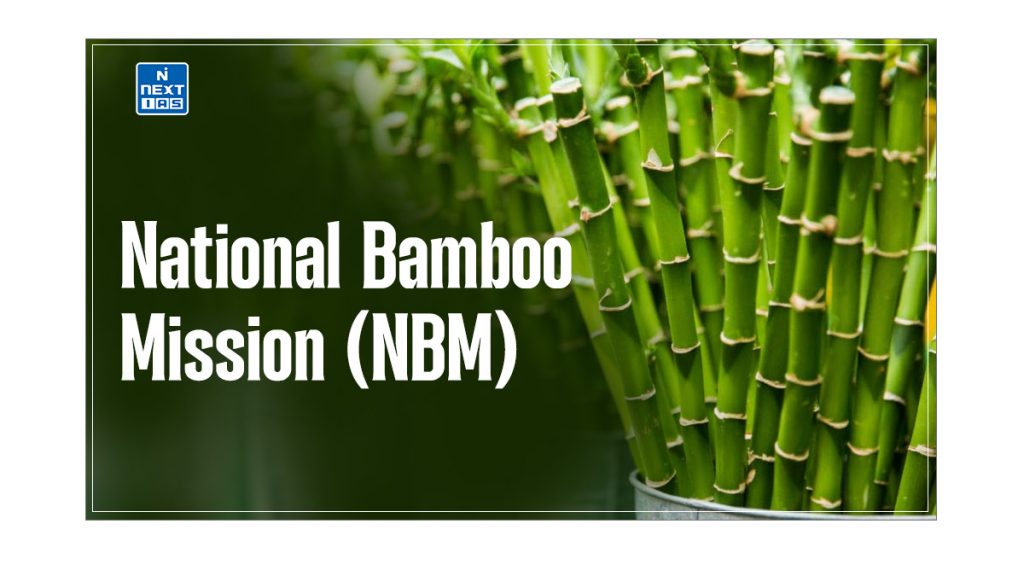
The National Bamboo Mission (NBM), launched in 2006-07, is an initiative by the Government of India to promote the holistic development of the bamboo sector. It focuses on sustainable cultivation, value addition, and marketing of bamboo products, enhancing rural livelihoods, fostering industrial growth, and contributing to environmental conservation.
About the National Bamboo Mission
- The National Bamboo Mission (NBM), launched in 2006-07 and later reorganized in 2018-19 under the National Mission for Sustainable Agriculture, has the mandate to promote overall development in the bamboo sector in India.
- Recognizing bamboo as a green and multi-purpose crop, the aim is to encourage more bamboo production in non-forest areas, improve post-harvesting, and improve value-added industries.
- NBM provides financial assistance for growing, processing, and marketing of bamboo to make it economically feasible.
- It focuses on the development of nurseries, skill upgradation, and new technology to improve productivity and quality.
- In addition, the mission will provide employment opportunities, particularly in the rural regions, and improve incomes for farmers through the inclusion of bamboo products into local and overseas markets.
- Focusing on sustainability, the National Bamboo Mission contributes to environmental conservation, carbon sequestration, and climate change mitigation and assists India in the transition towards a bio-economy.
Features of the National Bamboo Mission
The National Bamboo Mission (NBM), a flagship initiative under the Ministry of Agriculture & Farmers’ Welfare, aims to harness the potential of bamboo for economic, social, and environmental benefits. Below are its key features:
- Integrated Development of the Bamboo Industry: NBM encourages the cultivation of bamboo beyond the forests and enhances productivity in the current plantations. It facilitates activities ranging from the production of bamboo to market development to bring about integrated development.
- Value Addition and Processing: The aim emphasizes the need to establish processing plants, upgrading artisans’ skills, and incorporating modern tools and technologies in the processing of bamboo-based products. This is to enable the production of better quality bamboo merchandise for both local and global markets.
- Infrastructure Development Assistance: Assistance is provided for setting up nurseries, tissue culture labs, treatment centers, and other similar infrastructure for development of bamboo cultivation and utilization on sustainable levels.
- Improving Rural Livelihoods: By promoting bamboo-based livelihoods, the mission provides employment opportunities, particularly in the tribal and rural regions, which helps in economic empowerment.
- Research and Development: NBM promotes research on better varieties of bamboo, cultivation methods, and product development to enhance efficiency and productivity.
- Market Linkages and Branding: The project also enhances marketing of bamboo products through fairs, exhibitions, and branding schemes to increase demand and increase outreach.
- Environmental Benefits: Bamboo cultivation is engaged in carbon sequestration, water and soil conservation, and hence is a principal climate change mitigation and environmental sustainability instrument.
In essence, NBM integrates agriculture, industry, and the environment, making bamboo a significant contributor to India’s sustainable development goals.
Objectives of the National Bamboo Mission
The National Bamboo Mission (NBM) was launched to harness the potential of bamboo, an eco-friendly and versatile resource, for sustainable development and economic growth. Its key objectives include:
- Encourage Bamboo Cultivation: Encourage the cultivation of bamboo plantations on non-forest and degraded forest land to complement the raw bamboo supply, encourage resource sustainability, and increase carbon sequestration.
- Value Addition and Processing: Establish post-harvest management infrastructure, such as primary processing units, treatment plants, and value-addition facilities, to produce high-value bamboo products for both domestic and export markets.
- Develop Bamboo-Based Industries: Encourage the development of micro, small, and medium enterprises (MSMEs) in bamboo, enhancing entrepreneurship, employment, and local economic growth.
- Market Development: Strengthen market linkages by creating a network of bamboo industries, promoting trade fairs, and facilitating branding and marketing of bamboo-based products.
- Capacity Development and Competency Enhancement: Educate farmers, artisans, and entrepreneurs in the cultivation of bamboo, processing, and product development to improve their skills and performance.
- Research and Development: Promote research and development of bamboo technologies such as high-yielding varieties, pest control, and advanced processing technologies.
- Environmental Sustainability: Promote bamboo as an eco-friendly alternative to wood and other non-renewable materials, favoring afforestation, soil conservation, and global warming mitigation.
By achieving these objectives, the National Bamboo Mission aims to unlock the economic, social, and environmental potential of bamboo, fostering a self-reliant and sustainable bamboo sector in India.
Significance of the National Bamboo Mission
- The National Bamboo Mission (NBM) is of great importance to India because of the vast resources of bamboo in the nation and the scope of sustainable development of the same. Initiated by the Ministry of Agriculture and Farmers’ Welfare, NBM aims at harnessing the economic, environmental, and social benefits of the cultivation and use of bamboo.
- Economically, bamboo is a multipurpose material that can be used in numerous industries such as construction, handicrafts, furniture, paper, and bioenergy. The program supports development of the whole value chain—cultivation, processing, product innovation, and marketing. The process is attributed to enhance rural income, employment, and empower rural workers through a sustainable, high-value crop option. Importantly, it brings significant benefits to tribal populations and rural people who have traditionally relied on bamboo for livelihood.
- Ecologically, bamboo is a high-rate growth, renewable crop with high carbon sequestration potential and is thus a major contributor to climate change mitigation. It promotes soil conservation, erosion control, and groundwater recharge, leading to environmental sustainability.
- Socially, the mission promotes the artisanal industry, preserving traditional skills and inspiring creativity in bamboo products. It also reduces the dependence on timber, thereby reducing pressure on forests.
- By incorporating bamboo into agroforestry systems, NBM aligns with India’s sustainable development, environmental conservation, and poverty reduction commitments.
- The emphasis on skill building, technological advancement, and market access brings bamboo to the center of rural development and industrial growth. The National Bamboo Mission is thus the key to transforming India’s bamboo industry into a globally competitive power while promoting ecological sustainability.
Lacunae of the National Bamboo Mission
- National Bamboo Mission (NBM), though initiated with admirable intentions, suffers from a number of disadvantages which render it inefficient.
- Secondly, the execution of the mission has been uneven across states based on differences in administrative ability, infrastructure, and stakeholder participation. Technical capacities and capacity-building systems are inadequate in most states, constraining the scope of the mission.
- The absence of a standard method typically leads to individual endeavors, hence limiting the effects of changes within the bamboo industry.
- Secondly, there is a lack of adequate attention to market linkages. Although the mission encourages bamboo production and cultivation, small farmers and artisans often find themselves unable to sell their products to stable markets.
- This challenge is further exacerbated by poor awareness of value-added products and poor marketing of bamboo industries, hence limiting the income avenues for the stakeholders.
- In addition, the mission has not sufficiently addressed the challenges of research and innovation. The development of better bamboo varieties, new processing technologies, and innovative uses of bamboo is underfunded and underutilized.
- This absence of innovation stifles the industry’s competitiveness in the local and foreign markets.
- The mission also has difficulty combining livelihood and environmental goals. Although bamboo is a sustainable crop, large-scale plantations have the effect of creating monoculture agriculture, which can displace biodiversity and soil health. Small and poor farmers are also sometimes excluded from the benefits of the mission due to landholding and poor finance.
- To reach its true potential, the National Bamboo Mission requires improved policy coordination, increased market integration, and increased research and innovation to build a strong and inclusive bamboo ecosystem.
Key Pointers for the National Bamboo Mission Relevant to UPSC CSE Prelims
- Launched: 2006-07, restructured in 2018-19 under the Mission for Integrated Development of Horticulture (MIDH).
- Ministry: Implemented by the Ministry of Agriculture & Farmers Welfare.
- Objective: Promote the holistic development of the bamboo sector for income generation, sustainable livelihoods, and environmental conservation.
- Coverage: Focus on non-forest bamboo cultivation, particularly in Northeast India.
- Funding Pattern: Centrally Sponsored Scheme (60:40 for States, 90:10 for Northeast and Hilly States).
- Major Activities:
- Support for bamboo plantation on non-forest land.
- Establishment of nurseries and tissue culture labs.
- Processing, value addition, and marketing of bamboo products.
- Capacity building for farmers and artisans.
- Amendment in Forest Act 1927: Bamboo grown on non-forest land classified as grass, exempting it from regulatory restrictions.
- Environmental Significance: Bamboo sequesters carbon, prevents soil erosion, and improves water retention.
- Economic Impact: Supports industries like handicrafts, paper, furniture, and bioenergy.
- Target Group: Farmers, artisans, and entrepreneurs in the bamboo sector.
Way Forward
The National Bamboo Mission must focus on strengthening value chains, promoting bamboo-based industries, fostering innovation in product design, and enhancing market access. Encouraging private sector participation, integrating technology, providing skill development, and ensuring sustainable cultivation will help boost rural incomes, support climate resilience, and achieve self-reliance in the bamboo sector.
Conclusion
The National Bamboo Mission fosters sustainable bamboo cultivation, industrial growth, and rural development, aligning with India’s goals of environmental conservation and economic self-reliance. By enhancing livelihoods, promoting value-added products, and encouraging innovation, the mission establishes bamboo as a key resource for ecological balance and socio-economic progress.
Frequently Asked Questions (FAQs)
Which ministry launched National Bamboo Mission?
It was launched by the Ministry of Agriculture and Farmers’ Welfare as part of the National Mission for Sustainable Agriculture (NMSA).
Which city is known as the Bamboo City of India?
Banswara, a city in Rajasthan, is known as the Bamboo City of India.






